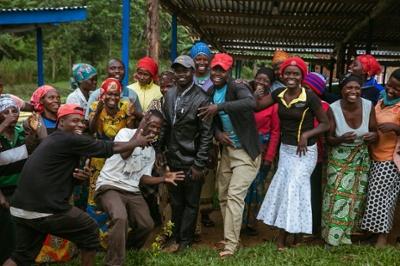Lot F814: Rwacof / Nyakabingo
This coffee highlights syrupy body with rich flavors of caramel, toffee, peach, apricot, citrus, banana, and jasmine. Well balanced with structured acidity. Long aftertaste with sugary sweetness.
Lot Description
| Reference Number: | F814 |
|---|---|
| Opening Bid: | $5.00/lb |
| Increment: | $0.10 |
| Weight: | 1,319 lbs |
| Process: | Fully washed |
| Altitude: | 1720-1950 masl |
| Origin: | Nyamasheke |
| Score: | 88.36 |
Farm details
Producer Story:
The trip to Nyakabingo washing station first takes you by car
towards its sister station, Kanyege.Then, you must get out and walk
the remaining kilometer up the west facing slope of the hill that
givesthe station its name. Looking out from the washing station,
one can see countless rolling hills continuing as far as the eye
can see. Cherry is selectively handpicked by farmers and delivered
to Nyakabingo washing station. At intake, the station floats all
cherry to remove any low-density cherry. Then, the high-density
cherry is hand sorted to remove any visible defects. After intake,
cherry is pulped using a disc pulper before being placed in
fermentation tanks to dry ferment for 12 to 18 hours. Following
fermentation, wet parchment is washed in clean water and placed in
thin layers on tables to sundry. Here, it is sifted regularly to
ensure even drying. The parchment will be covered during the
hottest times of the day and at night to prevent condensation.
RWACOF's Farmer Development Program in partnershipwith the London
School of Economics (LSE) supports farmers with training in Good
Agricultural Practices and access to loans, farm inputs and farm
services. A new soil health initiative uses soil analysis data that
RWACOF collected to identify farms where soil is too acidic. Lime,
along with education about application, is distributed to these
farmers to help improve soil quality. Additionally,seedling
nurseries provide up to 4 million seedlings per year to help
farmers renovate their rootstock. RWACOF also has many projects
that are designed to support farmers' overall livelihoods. They
focus on gender equality and support several women's cooperatives
by helping them access land, seedlings andreach a market for their
coffees. They offer trainings on financial literacy and alternative
income-generating activities.
The Farmer Hub program built retail shops that buy other crops
from farmers and sell them to families and schools at fair prices.
These retail shops help promote income diversification by creating
a market for othercrops and they supply nutritious foods at
competitive prices. The Farmer Hub program also offers loans
tofarmers as part of the farm management program.
On the environmental side, RWACOF has worked with partners to help
install solar panels at 2 washing stationsthat are off the
electrical grid. RWACOF's dry mill already have a 50
kilowatt-per-hour solar panel set upon their roof. They’ve
also mapped carbon emissions in their coffee supply chain and are
starting projects to half heir emissions per kg of coffee. Two ways
they're accomplishing this are by facilitating a transition
frominorganic to organic fertilizer and further by improving waste
(water and pulp) management at the wet mills. They're also working
with Trade in Space to map deforestation in the supply chain so
that they can begin to work with farmers to reduce deforestation
and improve forested areas in the supply chain.
Other info
Please read the terms and conditions before you bid on this item.



